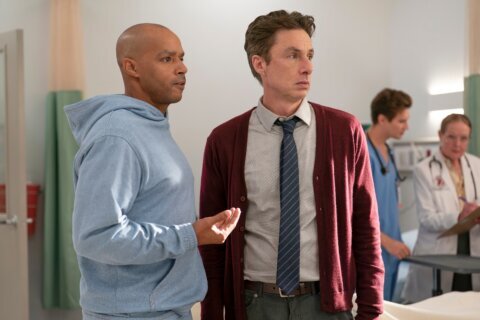The Folger Consort has been making music in D.C. since 1977, serving as the resident ensemble at the prestigious Folger Shakespeare Library on Capitol Hill.
Friday kicks off “Christmas with the Folger Consort,” streaming Dec. 11 to Jan. 5.
“We’ve been doing these Christmas concerts … for a very long time and we were not about to let the tradition go this year,” co-artistic director Bob Eisenstein told WTOP. “We’re very delighted that we’re able to do a virtual version. We were able to sneak in six performers at once [to film inside] St. Mark’s Episcopal, right across the street.”
For 44 years, Eisenstein has led the group alongside Christopher Kendall, specializing in “Early Music” before the year 1750 (before Mozart’s lifetime). The Consort uniquely performs on early 18th-century instruments, historical versions of the violin, cello, oboe, bassoon and organ, which is much smaller than a typical pipe organ today.
“We actually prefer the term ‘Historically Informed Performance,’ which has a really great acronym: HIP,” Eisenstein said. “It involves using the tools and the techniques that were used when the music was first composed. So, we apply these different styles and different instruments to music from the early Middle Ages to the 18th century.”
This year’s holiday concert kicks off with German composer Michael Praetorius.
“Michael Praetorius was this wonderful early 17th-century Lutheran,” Eisenstein said. “If you’re familiar at all with early 17th-century Christmas music, you probably know Michael Praetrius’ music. … Most are familiar with ‘Lo, How a Rose e’er Blooming.'”
It continues with the work of Colonial American composer William Billings, who published the first collection of U.S. music, “The New England Psalm Singer.”
“William Billings was a guy from colonial Boston,” Eisenstein said. “His family was a family of tanners and he followed in that trade, but he became a singing master. He published the first collection of music in the New World. In fact, Paul Revere [engraved] the front piece. … [Billings] became very, very popular during the Revolutionary War.”
You’ll next hear a series of English carols, including the work of composer Thomas Ravenscroft, as well as the well-known English melody “Greensleeves,” which was later repurposed as the beloved Christian Nativity hymn “What Child Is This?”
“‘Greensleeves’ is a very old English tune, it probably goes back to the 16th century,” Eisenstein said. “It was very popular to use it as a melody for new words, and some of the new words got associated with Christmas, so that’s why we associate that melody.”
The concert wraps with a cantata by J.S. Bach.
“It’s just magnificent music,” Eisenstein said.
Eisenstein himself blends traditions and vanguards, enjoying throwback comforts such as horseback riding, while teaching courses on music technology in Massachusetts.
“You’ll find that most of us who are involved in this Historically Informed Performance area also have a real attraction to contemporary music,” Eisenstein said. “That’s why many of my colleagues are able to put together these wonderful virtual performances.”
He invites viewers of all stripes to tune in, especially newcomers to this genre.
“People who are not familiar with this style of music, give it a try!” Eisenstein said. “It’s not something you need to know anything about to enjoy. It’s just really wonderful, delightful and entirely appropriate music for the season, so I hope you’ll join us.”
Listen to our full conversation here.








